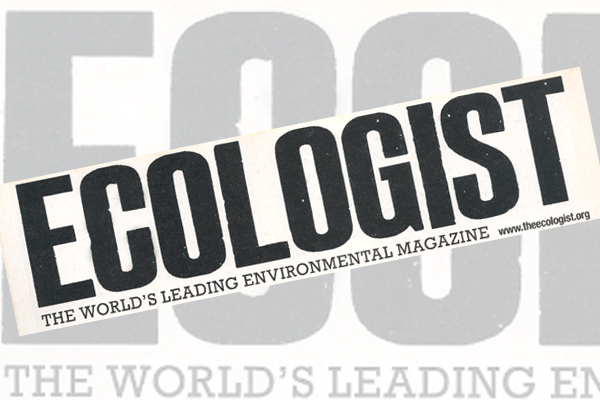None of The Main Parties Seem to Have a Clue About Food

In the run up to the British general election, Pat Thomas says the various party manifestos are starved of sound policies on food security and sustainability
Food is a four letter word. Or at least that’s the impression given by the election manifestos of the main political parties. Most of the documents devote a demure handful of paragraphs to the issue of food. Reading them you’d think that Britain was populated with some sort of 61-million-strong super race that had evolved beyond the need to eat every day.
Let’s start with the common ground. All the parties promise to reform the Common Agricultural Policy (CAP) – an easy promise since CAP is up for reform by 2013 anyway. Whether any of them really get the better deal for UK farmers as promised remains to be seen. Likewise most talk about reforming the EU Common Fisheries Policy – again a process that is already in place.
All the manifestos talk about creating a supermarket ombudsman – another easy promise since earlier this year the Competition Commission, after years of lobbying by food and consumer groups, strongly advised that we needed a body specifically to monitor supermarket behaviour and to enforce the Groceries Supply Code of Practice (GSCOP), which came into force in February of this year. At that time the Department for Business, Innovation and Skills finally accepted this recommendation and committed to forming such a body.
Likewise nearly all the parties commit to clearer labelling of food, particularly with regards to country of origin. The Liberal Democrat manifesto, in fact, makes no commitment to food beyond these areas.
Labour, the Conservatives and the Green Party also commit to encouraging more ‘grow your own’ schemes and (to varying degrees) to more access to allotments. Labour and the Greens also commit to more nutritious and to free school meals and to encouraging schools to have more vegetable gardens. The Conservatives focus a great deal on schools in general, but the only nod to food is a suggested a ban on vending machines.
Half-baked and lacking flavour…
From here the parties diverge into a variety of largely half-baked commitments and not terribly innovative ideas.
The incumbent Labour government has put a figure on its sustainable food plan – £1 billion. To those of us struggling to meet our mortgages, that may seem like a lot. But in reality it’s a pretty small investment – less than the cash commitments for education, health, transport and defence – and there is no real detail of how this food money will be spent.
Labour also makes a promise to balance ‘the multiple uses of land: safeguarding food security at the same time as enriching our natural environment; protecting distinctive landscapes while enabling environmentally sensitive development’ – a range of diffuse promises all rooted in the same system of production that has got us into trouble in the first pace. Implicit in the document is the idea that we can somehow balance an equation that has never before been balanced; i.e. we can produce mountains of food cheaply, pay our farmers good profits, keep prices at the till low, and at the same time protect the environment, our soil and biodiversity.
Flying the flag
The thrust of the Conservative argument is to ‘Buy British’ – a fantastic example of how to take a good idea and turn it into campaign slogan. They are a little sketchy on the details of what buying British actually means except where meat is concerned. The party want consumers to be assured that ‘meat labelled as ‘British’ is born and bred in Britain’.
In all this ‘Buy British’ fervour it’s easy to forget that labels can mislead. A Union Jack on the label can be used to cover all kinds of unacceptable practices such as massive indoor dairy facilities where the cows never see the light of day, battery chicken operations, British scallops obtained by dredging the ocean floor, British livestock fed on food containing GM soya and maize and…well, you get the picture. Likewise, it’s not beyond the bounds of possibility, given our addiction to wasteful transport in the food system, that British born and bred meat will still be sent elsewhere to be processed and packaged before being sent back to the UK for sale.
UKIP gets around this by proposing: ‘…labels that differentiate between ethically-produced and non ethically-produced food products’, though this begs the questions: why would anybody consciously choose non-ethical products and why not just ban them outright? Where meat production is concerned this is exactly what the Green Party proposes: to ‘phase out all forms of factory farming of animals and enforce strict animal welfare standards generally, including in organic agriculture’.
GM: options open
On the subject of GM and labelling, the Conservatives do make a commitment to better labelling of foods that may contain GM ingredients so that consumers can choose to buy or not. Again fair enough in principle, but what is the implied message here? That GM is inevitable and that we should leave it to market forces decide if people want to eat it? Is a label the biggest muscle a proposed Conservative government has to flex when it comes to genetically modified food? And where is the recognition that once GM is in the marketplace it can never be taken out again – effectively removing our freedom of choice regarding GM or non-GM foods?
Labour and the Liberal Democrats don’t mention GM food at all. UKIP jumps on the labelling bandwagon, but hedges its bets once more. The party vows to: ‘Continue to oppose the production of GM crops in Britain,’ whilst remaining ‘open to evolving scientific advice’. How different this is to the Green Party commitment to ‘support GM-free zones and continue to work for a complete ban on genetically modified food in Europe’.
The Greens have it
On the basis of the manifestos alone, and not just the information contained in them, but the language used to convey that information, the Green Party distinguishes itself from the others both in terms its understanding of the role of food in our lives, cultures and economies, and in the provision of some more concrete proposals to ensure a better, cleaner, fairer food supply.
Its manifesto acknowledges the role of small, mixed farms in providing the UK with a healthy diet and food security and makes clear commitments to: ‘localise the food chain, including assistance for small farms, starting farmers’ markets, farm box schemes and locally owned co-ops’; to ‘set new targets every five years and a minimum conversion of 10 per cent of UK food production to organic every five years’.
It also commits to reducing the dominance of supermarket chains through a range of measures that go beyond the ombudsman to: ‘vigorously enforcing monopoly legislation against the existing largest chains; prohibiting new out-of-town retailing’, and ‘requiring parking charges for private car parks with exemption for the disabled’ and ‘insisting that 50 per cent of retail floor space in all new developments is affordable space for local small businesses’.
If only the manifestos of those likely to be in power after May 6th would go this far in their thinking.
- Pat Thomas is a former editor of the Ecologist and author of the book Stuffed: Positive Action to Prevent a Global Food Crisis, Soil Association/Sawdays, £14.99).
- This article, which was published on the Ecologist website, is an extract from an in-depth analysis published on Pat’s website












